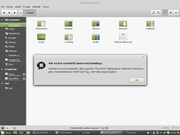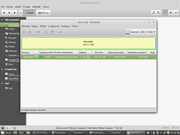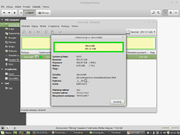df -h
barti@Bartek-PC ~ $ df -h
System plików rozm. użyte dost. %uż. zamont. na
udev 977M 4,0K 977M 1% /dev
tmpfs 199M 1,4M 198M 1% /run
/dev/sda1 28G 5,1G 21G 20% /
none 4,0K 0 4,0K 0% /sys/fs/cgroup
none 5,0M 0 5,0M 0% /run/lock
none 993M 676K 992M 1% /run/shm
none 100M 20K 100M 1% /run/user
/dev/sda2 118G 233M 112G 1% /home
/dev/sdd4 930G 924G 7,0G 100% /media/barti/Linux Mint
/dev/sde4 7,6G 107M 7,5G 2% /media/barti/JAGIENKA
barti@Bartek-PC ~ $
mount
barti@Bartek-PC ~ $ mount
/dev/sda1 on / type ext4 (rw,errors=remount-ro)
proc on /proc type proc (rw,noexec,nosuid,nodev)
sysfs on /sys type sysfs (rw,noexec,nosuid,nodev)
none on /sys/fs/cgroup type tmpfs (rw)
none on /sys/fs/fuse/connections type fusectl (rw)
none on /sys/kernel/debug type debugfs (rw)
none on /sys/kernel/security type securityfs (rw)
udev on /dev type devtmpfs (rw,mode=0755)
devpts on /dev/pts type devpts (rw,noexec,nosuid,gid=5,mode=0620)
tmpfs on /run type tmpfs (rw,noexec,nosuid,size=10%,mode=0755)
none on /run/lock type tmpfs (rw,noexec,nosuid,nodev,size=5242880)
none on /run/shm type tmpfs (rw,nosuid,nodev)
none on /run/user type tmpfs (rw,noexec,nosuid,nodev,size=104857600,mode=0755)
none on /sys/fs/pstore type pstore (rw)
/dev/sda2 on /home type ext4 (rw)
binfmt_misc on /proc/sys/fs/binfmt_misc type binfmt_misc (rw,noexec,nosuid,nodev)
systemd on /sys/fs/cgroup/systemd type cgroup (rw,noexec,nosuid,nodev,none,name=systemd)
gvfsd-fuse on /run/user/1000/gvfs type fuse.gvfsd-fuse (rw,nosuid,nodev,user=barti)
/dev/sdd4 on /media/barti/Linux Mint type vfat (rw,nosuid,nodev,uid=1000,gid=1000,shortname=mixed,dmask=0077,utf8=1,showexec,flush,uhelper=udisks2)
/dev/sde4 on /media/barti/JAGIENKA type fuseblk (rw,nosuid,nodev,allow_other,default_permissions,blksize=4096)
barti@Bartek-PC ~ $
fdisk -l
barti@Bartek-PC ~ $ fdisk –l
fdisk: nie można otworzyć –l: Nie ma takiego pliku ani katalogu
barti@Bartek-PC ~ $
albo nic
cat /etc/fstab
barti@Bartek-PC ~ $ cat /etc/fstab
# /etc/fstab: static file system information.
#
# Use 'blkid' to print the universally unique identifier for a
# device; this may be used with UUID= as a more robust way to name devices
# that works even if disks are added and removed. See fstab(5).
#
# file system mount point type options dump pass
# / was on /dev/sda1 during installation
UUID=cdef1c62-96b4-43b0-8f39-64d907b3d713 / ext4 errors=remount-ro 0 1
# /home was on /dev/sda2 during installation
UUID=d51d5f93-22da-42c1-a771-a7c5c0fb0a58 /home ext4 defaults 0 2
# swap was on /dev/sda5 during installation
UUID=d26ef55e-8938-4500-9050-333173ea7756 none swap sw 0 0
barti@Bartek-PC ~ $
Zrzuty z pierwszego posta:










